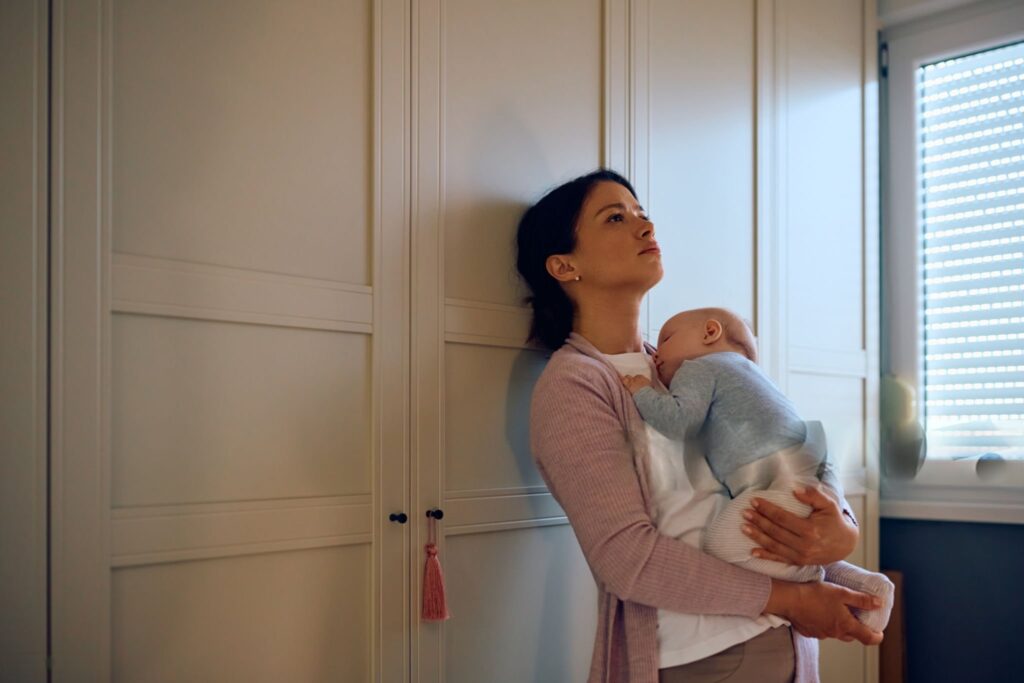After bringing five beautiful children into this world and supporting hundreds of mothers through their postpartum journeys over my 20+ years as a midwife, I’ve witnessed firsthand how maternal mental wellness can profoundly impact the early parenting experience. Today, I’m sharing insights from both professional expertise and personal experience to help you recognize when the “baby blues” might be something more serious.
Understanding Maternal Mental Wellness After Birth
That magical moment when you first hold your baby—the one you’ve dreamed about for nine months—is supposed to be pure bliss, right? But what happens when those feelings of joy are overshadowed by persistent sadness, overwhelming anxiety, or a sense of disconnection?
After the birth of my third child, I found myself crying uncontrollably every evening as the sun set. As a midwife, I knew about postpartum mood disorders intellectually, but experiencing those feelings personally gave me a whole new perspective on maternal mental wellness and how crucial early recognition and support truly are.
According to the American College of Obstetricians and Gynecologists, up to 1 in 7 women experience postpartum depression, while many more struggle with anxiety, OCD, or other mood disorders after birth. These conditions are medical issues—not character flaws or signs of weakness—and recognizing this is the first step toward healing.
Baby Blues vs. Something More Serious
Almost 80% of new mothers experience what we call the “baby blues”—temporary mood swings, tearfulness, and emotional sensitivity that typically begin 2-3 days after delivery and resolve within two weeks. This emotional rollercoaster is completely normal and coincides with dramatic hormonal shifts after birth.
With my first baby, I remember bursting into tears because we ran out of paper towels—hardly a crisis! These fleeting emotional moments are part of the normal postpartum experience and generally don’t interfere with your ability to care for yourself or your baby.
However, symptoms that are more intense, last longer than two weeks, or significantly impact your daily functioning may indicate a perinatal mood disorder requiring additional support. Monitoring your maternal mental wellness during this vulnerable time is as important as checking your physical recovery.
Signs of Postpartum Depression You Shouldn’t Ignore
Postpartum depression (PPD) can develop anytime within the first year after childbirth, though it often begins within the first three months. As both a mother and midwife, I’ve found that women often dismiss their symptoms or try to “power through,” thinking their struggles are just part of new motherhood.
Emotional and Psychological Warning Signs
The emotional symptoms of PPD can vary greatly in intensity and combination:
- Persistent feelings of sadness, emptiness, or hopelessness
- Excessive crying, often without an identifiable trigger
- Irritability or anger toward your baby, partner, or other children
- Withdrawing from family and friends
- Loss of interest in activities you previously enjoyed
- Feelings of worthlessness, shame, or excessive guilt about your parenting
- Thoughts of harming yourself or your baby
One client I’ll never forget—let’s call her Emma—described her experience as “living behind glass.” She could see her baby and family, but felt completely disconnected from them, like she was observing someone else’s life. This profound sense of detachment is a common but rarely discussed aspect of maternal mental wellness challenges.
Physical Symptoms That May Surprise You
PPD doesn’t just affect your emotions—it can manifest physically in ways many women don’t expect:
- Changes in appetite (either significantly increased or decreased)
- Sleep disturbances beyond normal newborn care (inability to sleep when the baby sleeps)
- Extreme fatigue or complete lack of energy
- Physical restlessness or sluggishness
- Headaches, chest pain, or hyperventilation (especially with anxiety)
After my fourth baby, I developed mysterious digestive issues that wouldn’t resolve. It wasn’t until I addressed my underlying anxiety that these physical symptoms improved—a powerful reminder of the mind-body connection in maternal mental wellness.
Daily Functioning and Relationship Effects
Pay attention to how these symptoms impact your daily life and relationships:
- Difficulty bonding with your baby or feeling emotionally numb toward them
- Overwhelming doubt about your ability to care for your child
- Problems concentrating, making decisions, or remembering details
- Avoiding social situations you would normally enjoy
- Increasing conflict with your partner or family members
I often tell mothers that the question isn’t whether you love your baby—of course you do—but whether intrusive thoughts or overwhelming feelings are preventing you from enjoying that love. Your maternal mental wellness affects not just you, but your entire family’s dynamic.
Recognizing Postpartum Anxiety: The Hidden Struggle
While postpartum depression receives more attention, anxiety disorders are actually more common during the postpartum period. Many women experience intense anxiety that goes far beyond normal new parent worries.
The Many Faces of Postpartum Anxiety
Postpartum anxiety (PPA) can manifest in several forms:
- Generalized anxiety with constant worry and feeling that something bad will happen
- Panic attacks with physical symptoms like racing heart, chest pain, or shortness of breath
- Obsessive-compulsive symptoms including intrusive thoughts or repetitive behaviors
- Hypervigilance about the baby’s health, safety, or development
During my years of midwifery practice, I’ve noticed that high-achieving women who “had it all together” during pregnancy are particularly vulnerable to postpartum anxiety. The loss of control that comes with caring for a newborn can trigger anxiety in ways that catch these mothers completely off guard.
When Worry Becomes Excessive
Some worry is normal when caring for a vulnerable newborn. However, anxiety becomes problematic when:
- It dominates your thoughts for much of the day
- It significantly interferes with sleep (beyond normal baby care)
- You develop rigid routines or checking behaviors to manage your fears
- You avoid certain activities or situations because of your anxiety
- Physical symptoms like chest pain, dizziness, or nausea become common
After my second baby, I developed what I now recognize as postpartum anxiety. I would check his breathing multiple times every night, convinced something would happen if I didn’t. This hypervigilance, while coming from a place of love, actually prevented me from getting necessary rest and enjoying those precious early weeks. Recognizing and addressing these patterns is crucial for maternal mental wellness.
The Physical Experience of Anxiety
Anxiety lives in the body as much as in the mind, often causing physical symptoms such as:
- Constant tension in your shoulders, jaw, or other muscles
- Digestive issues including nausea or diarrhea
- Racing heart or palpitations
- Dizziness or lightheadedness
- Shortness of breath or feeling you can’t get enough air
One mother in my practice described her anxiety as “living with an internal earthquake”—appearing calm on the outside while feeling constant tremors within. Understanding these physical manifestations helps many women recognize their anxiety for what it is, rather than fearing a physical illness.
Risk Factors: Who’s Most Vulnerable?
While any new mother can develop postpartum mood disorders, certain factors can increase your risk. Understanding these can help you and your support people remain vigilant about your maternal mental wellness.
Personal and Family History Considerations
Some risk factors relate to your personal or family history:
- Previous depression, anxiety, or other mood disorders
- Family history of mental health conditions
- Previous perinatal mood disorder with other children
- History of premenstrual dysphoric disorder (PMDD)
- Previous trauma or adverse childhood experiences
When I work with mothers who have these risk factors, I emphasize that awareness is power. Knowing you may be more vulnerable allows you to establish stronger support systems before baby arrives.
Pregnancy and Birth Circumstances
Certain pregnancy and birth experiences can increase vulnerability:
- Complications during pregnancy or birth
- Premature birth or NICU stay
- Birth experience that differed significantly from expectations
- Medical trauma during birth
- Multiple births (twins, triplets)
- Physical recovery challenges or breastfeeding difficulties
After a difficult birth with my fifth child, I experienced intrusive thoughts about the birth that I now recognize were symptoms of birth trauma. These experiences can profoundly impact your maternal mental wellness if not addressed.
Social and Environmental Factors
Your external circumstances and support system play a crucial role:
- Limited social support or isolation
- Relationship stress or conflict
- Financial concerns
- Major life changes coinciding with new parenthood
- Sleep deprivation beyond typical newborn patterns
- Previous pregnancy or infant loss
The Centers for Disease Control and Prevention notes that social support is one of the most significant protective factors against postpartum mood disorders. This is why creating a “village” around new mothers is not just helpful but essential for maternal mental wellness.
When and How to Seek Help
If you recognize these symptoms in yourself or someone you love, knowing when and how to seek help is crucial. Early intervention makes an enormous difference in recovery.
When to Reach Out
Contact your healthcare provider if:
- Symptoms last longer than two weeks after birth
- You’re having trouble caring for yourself or your baby
- Symptoms are getting worse rather than better
- You have thoughts of harming yourself or your baby
- You feel disconnected from your baby for more than a few days
- Daily functioning is significantly impaired
- You’re using alcohol or drugs to cope with your feelings
Remember that maternal mental wellness concerns are medical issues requiring proper care, just like any physical postpartum complication would. You deserve support and have nothing to feel ashamed about.
Who Can Help?
Several types of professionals can provide support:
- Your midwife or OB/GYN
- Your primary care physician
- Psychiatrists who specialize in perinatal mental health
- Therapists with training in postpartum mood disorders
- Postpartum doulas with mental health training
- Support groups (in-person or online)
When my client Sarah was struggling with postpartum depression, she found that a combination of therapy and a peer support group provided the most complete support. Different women need different types of help for optimal maternal mental wellness.
What to Expect When You Ask for Help
Many women worry about what will happen if they disclose mental health struggles. Here’s what you can generally expect:
- Your provider will likely use a screening tool like the Edinburgh Postnatal Depression Scale
- They’ll ask questions about your symptoms, their duration, and impact on your life
- They may perform a physical exam or lab tests to rule out conditions like thyroid issues
- Together, you’ll discuss treatment options that may include therapy, medication, support groups, or lifestyle modifications
When one mother in my practice finally reached out for help, she told me later, “I was so afraid they would take my baby away if I admitted how I was feeling. Instead, they helped me become the mother I wanted to be.” This is the reality of proper care for maternal mental wellness issues.
Supporting a Loved One Through Postpartum Mental Health Challenges
If you’re reading this because you’re concerned about someone you love, your awareness and support can make an enormous difference in their recovery.
Signs to Watch For
As a support person, watch for these potential indicators:
- Excessive worry or fear that doesn’t improve with reassurance
- Withdrawal from family and friends
- Expressing feelings of failure or being overwhelmed most of the time
- Changes in personality or behavior that seem out of character
- Difficulty bonding with the baby or expressing negative feelings about parenthood
- Excessive irritability, anger, or mood swings beyond typical new parent fatigue
As partners are often the first to notice changes, I always include them in discussions about maternal mental wellness during prenatal appointments and postpartum visits.
How to Offer Meaningful Support
If you notice concerning symptoms:
- Express concern with love, not judgment (“I’ve noticed you seem to be struggling, and I care about you”)
- Offer specific help rather than general statements (“I’m going to bring dinner Thursday and hold the baby while you nap”)
- Listen without trying to fix everything
- Encourage professional help while normalizing the need for support
- Help with practical tasks like baby care, household chores, and meals
- Remember that recovery takes time and your continued support matters
When my sister was experiencing postpartum anxiety, my most important role was simply validating that her struggles were real and helping her find the right professional support for her maternal mental wellness needs.
Self-Care Strategies to Support Mental Health
While professional help is essential for moderate to severe symptoms, these self-care practices can support your recovery and overall wellbeing:
Physical Foundations for Emotional Health
Attend to your basic physical needs:
- Prioritize sleep whenever possible, even if it means accepting help with night feedings
- Nourish your body with regular, nutritious meals and snacks
- Move your body gently—even short walks can boost mood and energy
- Limit substances that can worsen mood or anxiety, including alcohol and caffeine
During my own postpartum recovery periods, I found that eating protein-rich snacks throughout the day helped stabilize my mood and energy levels—a simple but effective strategy for supporting maternal mental wellness.
Emotional Support and Connection
Nurture your emotional needs:
- Share your feelings with trusted friends or family members
- Join a new parents’ group to connect with others in a similar life stage
- Set boundaries around visitors and social obligations
- Practice self-compassion and challenge perfectionist expectations
- Consider journaling to process your experiences and track your mood
Finding Moments of Joy and Calm
Even brief moments of positive emotion can help:
- Practice mindfulness or meditation for even just 5 minutes daily
- Spend time outdoors when possible
- Engage in small activities you enjoyed before baby when you can
- Use relaxation techniques like deep breathing when anxiety rises
- Listen to music, podcasts, or audiobooks during feeding sessions
One technique that helped me enormously was taking three deep breaths every time I sat down to nurse my baby. This simple ritual became a moment of calm in chaotic days and supported my maternal mental wellness in a practical, accessible way.
Breaking the Silence: Why We Need to Talk About Maternal Mental Health
As both a midwife and mother who has experienced postpartum anxiety firsthand, I believe strongly that breaking the silence around these issues is essential. When we share our stories and normalize these experiences, we create space for more women to seek the help they need.
One client told me that hearing about my own struggles gave her “permission” to acknowledge hers. This is why I continue to speak openly about maternal mental wellness—because no mother should suffer in silence, believing she’s the only one struggling or that her feelings make her a bad mother.
The reality is that taking care of your mental health makes you a better parent, not a lesser one. It demonstrates courage, self-awareness, and a commitment to providing the best care possible for your child by first caring for yourself.
If you’re currently in the midst of postpartum depression or anxiety, please know that with proper support, you will feel better. These conditions are highly treatable, and seeking help is the strongest choice you can make for yourself and your family.
And if you’re reading this before your baby arrives or while supporting someone you love through the postpartum period, your awareness and vigilance about maternal mental wellness can make all the difference between suffering in silence and finding a path to healing.
The journey of motherhood transforms us in countless ways—some joyful, some challenging. By recognizing when those challenges require additional support, we honor both the intensity of this transition and our own needs as women navigating one of life’s most profound changes.
From my heart to yours, with the wisdom of five journeys through postpartum and thousands of mothers supported: You are not alone, you are not to blame, and with help, you will feel better.



